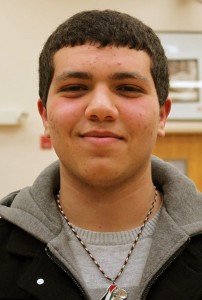
Just days after exchange student Haytham Mohanna made the long journey from Southeast Alaska to his home in the Gaza Strip, the conflict between Israel and Hamas escalated into war.
Haytham lived and studied in Haines through a U.S. Department of State program that brings students from Muslim countries to America.
Two months ago, 17-year-old Haytham Mohanna was kayaking in Sunshine Cove and hiking to the Mendenhall Glacier ice caves in Juneau.
Now, Haytham is home in Gaza City spending his summer break in a war zone.
“Every minute we are expecting a bomb. When we hear a near bomb, we are saying that our house is going to be the next one,” Haytham says.
His family has an emergency bag packed with their identification and other important documents. If they get a call that their house will be bombed, they’re ready to evacuate.

“My family is lucky ‘til now that nobody died and they didn’t see anyone dying,” Haytham says.
At the moment, he is living with 14 people – his parents, grandmother, three siblings and his aunt’s family.
“Her house kind of is near the tanks and the bombs, so she’s scared and ran away from there and she came to our house,” Haytham says.
His parents and siblings sleep on the floor, while his aunt’s family shares the six beds in the house. It’s crowded, but up to 50 people have stayed in the house during other wars. This is Haytham’s third.
Haytham says they haven’t had electricity for more than a week. His family has their own gas-run generator, which they turn on to charge flashlights, laptops and phones. They also use it to pump water to the house.
Without a refrigerator, Haytham’s father takes the risk of going to the market a few times a week.
“In the U.S. we had fulltime electricity, we have water all the time, we have freedom to go anywhere. But here, I can be scared to go out to get the trash out of the house and I’ll be scared if I’m going to go to our neighbors’ to drink some tea or something. It’s really hard to get out, even from the house,” Haytham says.
The last time Haytham went outside was more than 10 days ago during a ceasefire. It lasted six hours.
“I went to hang out with my friends. We tried to go and get a haircut but the places were very crowded so we didn’t have a haircut,” he says.
Everyone was in the streets.
“People were happy, you know, just going out from their houses. Not really happy, just relief, you know,” he says.
Haytham says days pass inside the house doing nothing and he loses track of the date. He only sleeps between 5 and 10 a.m. when bombs are less frequent. He says there are more bombs at night.
Inside, Haytham says his family still occasionally laughs.
“But it’s not the laugh that comes from the heart. We just laugh to let my 6-year-old brother to laugh and feel that he’s safe and we’re not in danger,” he says.
Haytham has mixed feelings toward the U.S. due to its relationship with Israel. The U.S. provides Israel with $3 billion in foreign military financing annually, according to the Department of State.
Haytham misses living in Haines, but he says, “I can’t really wish to be there right now. My country now needs me. If everyone wishes to be outside, nobody is going to be in Gaza. There should be people staying in Gaza so they can protect it and after the war, they can build it.”
Haytham is supposed to start his senior year of high school at the end of the month. But, he says, schools have delayed opening. Even if the war ends soon, it’ll still take time to repair.
Related content:
Differences between U.S. & Gaza Strip? Weather and freedom
Origami peace peacock finds a home in the state capitol
Forum@360: Middle East to Southeast
Haytham Mohanna on Photography
Lisa Phu is a reporter at KTOO in Juneau.




